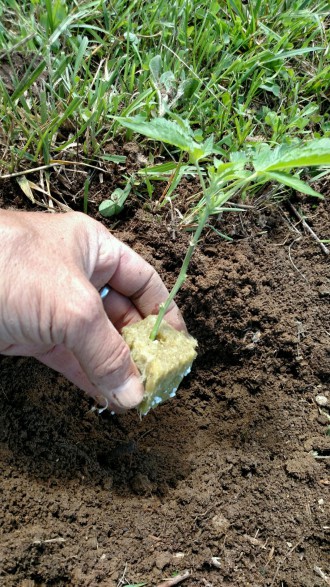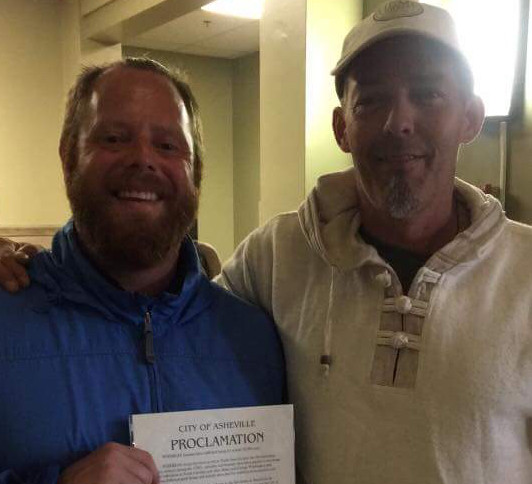In early June, Brian Bullman and Brian Morris, founders of Asheville-based Carolina Hemp Co., were about halfway through an all-hands-on-deck planting process. “We’ve been out here planting every day, including the weekend,” says Bullman.
The growers are thrilled to finally be planting hemp in WNC. “It was definitely a quasi-spiritual moment when we put those first plants in the ground. We weren’t sure if this was going to happen. We’ve been working at this for three years and we weren’t sure up until we actually planted the plants. It’s significant and it’s the first real big opportunity for people to get involved and help a whole new industry,” says Bullman.
That planting frenzy is a far cry from the waiting game that potential hemp growers were playing earlier this spring. On April 26, Mountain Xpress reported on how the U.S. Drug Enforcement Administration’s strict interpretation of hemp’s legality was hindering the N.C. Industrial Hemp Commission’s efforts to set its hemp pilot program in motion. In late April, prospects of a successful 2017 research pilot program seemed dismal, as the planting window for this season was rapidly vanishing.
Yet in mid-May, the N.C. attorney general’s office issued an advisory letter concluding that the Agricultural Act of 2014 did not prohibit growers from obtaining seed from other states’ industrial hemp programs. That letter gave the Hemp Commission enough confidence to issue licenses to those North Carolina farmers who had been waiting to obtain hemp seed or plants before the clock ran out on planting for this year.
Growers must agree to participate in state-run research and reporting, and adhere to a 0.3 percent THC content limit. Those who plan to import seed internationally must obtain a DEA import permit, but growers sourcing seeds or plants domestically were essentially given the go-ahead to move forward immediately.
Carolina Hemp Co.’s Bullman and Morris are among the recently licensed growers. Their business currently operates as a wholesale distributor of hemp goods, with an emphasis on products infused with CBD, or cannabidiol, a non-psychoactive substance found in the cannabis plant that preclinical research has shown to have a range of therapeutic effects, including pain reduction, according to the National Institute of Drug Abuse.
Bullman and Morris, who had already been planning to source live cultivars from Colorado, were prepared to spring into action upon the commission’s approval. “Once we got that green light, which was very late in the season in the first place, we were able to move quickly on the connections we’d made [in Colorado], and make a run to pick up the clones,” says Bullman, referring to cultivars that are produced asexually, so that all the derived plant material is genetically identical.
Getting the plants back to Asheville was no easy feat. The trip took a week and required careful transport of the fledgling hemp plants, while the pressure mounted to get them in the ground in time to mature this season. “We got back with them the Friday before Memorial Day and proceeded to start planting the following Tuesday,” says Bullman.
Leicester-based Franny’s Farm is also participating in the inaugural season of the state’s industrial hemp program. “We’re an N.C. State research site and are planting 2 acres of industrial hemp,” says Franny’s Farm owner Frances Tacy. According to Tacy, Franny’s Farm recently received seed sourced from Italy and planned to begin planting on Father’s Day.
Blake Butler, founder of HempX Asheville, says he’s moving the two-day festival to Franny’s Farm this September to celebrate hemp’s new legality and the farm’s involvement in the pilot program. “Franny’s 2 acres are designated for research and she’s doing something really cool with it, Butler says.
Rolling with the punches
Carolina Hemp Co. has planted approximately 6,500 female hemp clones on 8 acres of WNC farmland that Bullman says is conducive to hemp farming because it features rich, fertile soil and a relatively mild climate. Bullman explains that they’ve chosen a rather untraditional approach to planting their first hemp crop, largely due to getting approved so late in the season.

“We’re planting each plant by hand in a field that is what you would consider perfect growing conditions. We’re approaching this as a permaculture style of planting, in that we’re not preparing rows like you’d traditionally see in farming,” says Bullman. “What we’re doing is leaving the field intact because it’s alive and it offers premium growing conditions with minimal input.”
Bullman says it takes a tremendous amount of labor to grow hemp this way, especially after getting a late start. “We’re probably talking about 1,000 hours of labor over the course of the summer that we otherwise would have been able to diminish greatly, just from having to plant so much later in the season” he says.
Bullman says there is a lesson to be learned by other states considering instituting pilot programs. “By the agricultural department dragging its feet — whether it’s good or bad, it doesn’t matter — what it does is lay an additional burden of cost on maintenance, because our plants are competing with very well-established hay grass right now,” Bullman says.
Bullman also suspects they might see lower yields due to the delayed planting. “I think that planting late is going to minimize the yield that we get, which has an effect on the bottom line, but it’s not going to diminish it so much that it’s not going to be worthwhile,” he says.
Bullman realizes that along with some of the hurdles faced by delayed planting, there will likely be some growing pains as first-time industrial hemp growers. “We’re new at this, it’s a new crop for the area, and we’ve got a lot to learn. It’s the first year and we expected there to be hurdles. Next year, we’ll be way ahead of the game and shouldn’t expect some of these issues,” he says.
Bullman says Carolina Hemp Co. will likely be harvesting in early to mid-September.
From plants to products
Growing the plants is just the first step in producing CBD. “We’re potentially looking at as much as 7 tons of flower, biomass, plant material that will need to be extracted. We first have to cut it and hang it to dry and cure it to a specific moisture content, and we’re in the process of setting up our drying process. From there it will go to our extraction partners, and it looks like we’ve aligned with a company here in Asheville [Extract World], that is moving their project back here to their home. They have been out West for the last few years developing some incredible extraction technology,” says Bullman.
Bullman says once they extract the oil, they will preserve it and have the option to make products out of it or bulk sell the concentrated product. “There’s a number of different products ranging from edibles, tinctures, topicals, drinks — almost anything you put this extracted product into. You can use it in so many ways that it’s hard to wrap your mind around,” says Bullman.
A long time coming
For many N.C.-based hemp industry advocates, the hemp pilot program has been a multi-year passion project. “I came to Asheville in 2010 as a volunteer to help build one of the first hempcrete homes in America,” says Asheville-based entrepreneur, consultant and hemp advocate Timothy Sadler, who plans to join the Carolina Hemp Co. team. “After being here for two weeks, I went home, packed my stuff and was living here permanently within six weeks. Once on the ground, I began actively working to [have] legislation passed on the state level and organizing Hemp History Week for the past six years.”
Hemp History Week aims to raise awareness about the environmental sustainability, health benefits, regenerative agriculture potential and new technological applications of industrial hemp, according to a release from the organization.
Sadler believes that creating a strong hemp industry will provide the WNC area with significant opportunities. “Hemp represents the perfect intersection of economic development and environmental protection. And with our goal of weaving in a social justice component, a perfect storm of positive change is created,” he says.



I admire these gentlemen’s efforts in light of the real possibility of the Rohrabacher–Blumenauer amendment (formerly Rohrabacher–Farr) expiring in September of this year.